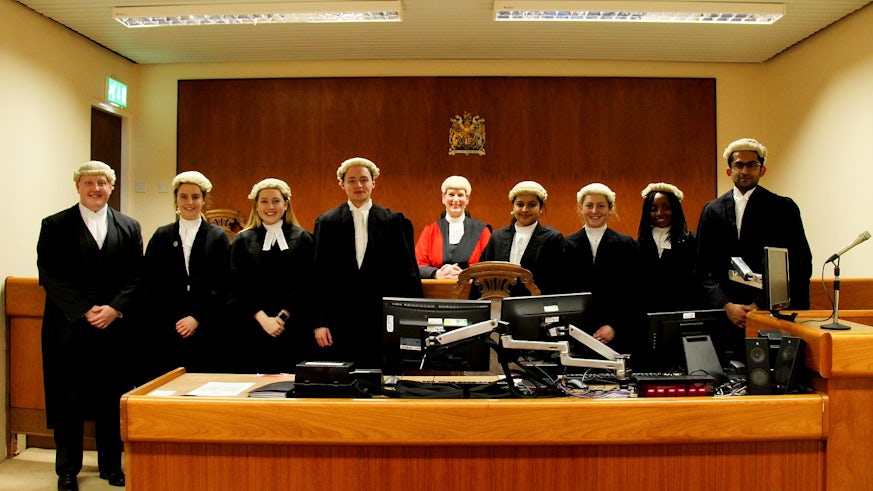Mock trial returns following Covid hiatus
21 June 2022

This March, Cardiff Professional Legal Studies (CPLS) held a mock trial for students in a real crown court; an opportunity to hone essential advocacy skills and competencies.
Providing our students with experience they can use following university is a key part of what we offer at the School of Law and Politics. Prior to the pandemic, CPLS would organise an annual mock trial competition which would culminate in a final at Cardiff Crown Court, made possible via professional contacts and funding from Times Educational Supplement (TES).
A mock trial is a fictitious criminal trial involving the Prosecution trying to prove its case against the Defendant, with live witnesses being called and cross examined and opening and closing speeches to a jury. The trial takes a great deal of organisation and involves volunteers who play witnesses, judge and jury.
Thankfully, following the lifting of COVID restrictions, this year’s trial could take place on 25 March in Court 6 of Cardiff Crown Court. The Recorder of Cardiff, HHJ Tracey Lloyd-Clarke acted as Judge and CPLS staff acted as Usher and Clerk. Funding allowed for professional actors to be used as the two witnesses and the Defendant.
Speaking following the event, organiser Sarah Waters said, “The mock trial requires communication, persuasion, research and analytical skills. The students have to formulate questions and be adaptable (to witnesses answers) and also have the ability to listen carefully and respond quickly and effectively whilst on their feet.”
“Aside from the educational benefit of doing the advocacy task, the students massively benefit from having to work as a team. They all have to work together to formulate a 'case theory' for their side and ensure that what each does advances that case theory, fits with the work of their teammates and leads seamlessly to a powerful closing speech.”
Nine teams had taken part in this year’s competition, but the final teams were Rhys Allen, Mari Watkins, Emily Bennett, and Charles Archer as the Prosecution and Amy O’Hare, Anisha Rai, Sanwal Jamal, and Taya Sayekaya as the Defence. HHJ Lloyd-Clarke commented that the advocacy skills of both teams were excellent but decided that the Prosecution team had a narrow victory. Anisha Rai, part of the Defence team, achieved the best overall advocate accolade. All those who had participated in the competition were able to spectate, some of whom acted as the Jury (who, unfortunately for the Defendant, delivered a Guilty verdict!).
Following the event, the Judge awarded prizes and spoke individually to the finalists. Other local practitioners were also present, and students were given a valuable opportunity to network.